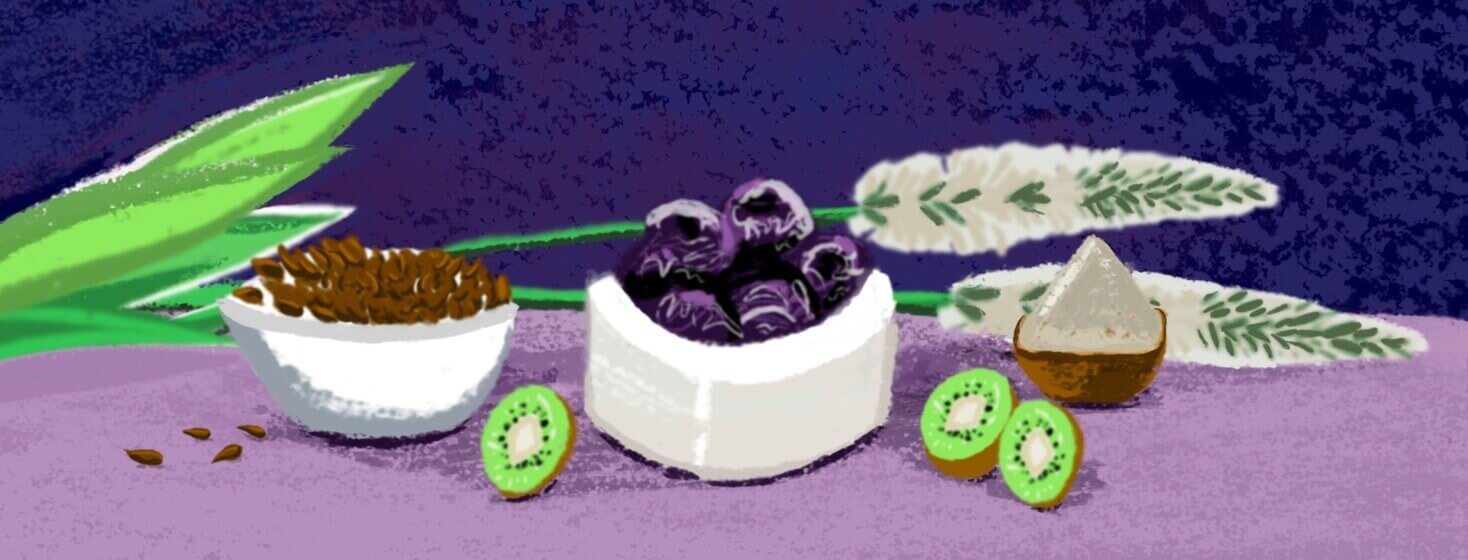4 Foods That Help With Constipation
Feeling backed up but don’t want to jump straight to laxatives? You might want to look at your diet first. Many foods are recommended to help with constipation, but not all work. Here are 4 foods with science to back up their claims as constipation-busters.
4 foods for constipation
Kiwi fruit
Kiwi fruit is often recommended for constipation relief, and research is starting to support those recommendations. A systematic review and meta-analysis (a type of study combining the results of other studies) published in 2021 found evidence that eating 2 kiwi fruit per day helped waste move through the gut. This helped relieve constipation.1
There are several reasons kiwi fruit may improve constipation. The first is that they are high in fiber, which can increase the volume of your stool. This makes it easier to have a bowel movement. They also contain an enzyme called actinidin, which breaks down protein and stimulates receptors in the large intestine.1
Try eating diced kiwi with yogurt for a snack, or add it to a smoothie for a constipation-busting drink.
Flaxseeds
A study of 90 people with constipation who ate 50 grams of flaxseed flour with meals per day found that eating flax was associated with increased bowel movements per week. It was also linked to improved quality of life and an overall improvement in bowel habits.2
Try adding ground flax to cereal, yogurt, salads, or smoothies.
Psyllium husk
Psyllium husk is a natural, mostly soluble (meaning it dissolves in water) fiber that forms a gel when mixed with fluid.3
Psyllium husk is frequently recommended to people with constipation, and with good reason. It has been found to benefit both constipation- and diarrhea-predominant IBS. The American College of Gastroenterology even recommends psyllium husk as a treatment for IBS.4
A word of caution – if you consume psyllium husk without increasing your fluid intake, you could become more constipated. If you are adding psyllium to your diet, be sure to drink more fluids as well.5
Not sure how to use psyllium? The easiest way to take it is mixed with a glass of water or juice. You also could try adding it to a smoothie. Regardless of what liquid you mix it with, be sure to drink it right away. Psyllium absorbs a lot of water and will thicken whatever liquid you mix it with if you leave it sitting for too long.
Prunes
Prunes (dried plums) are well-established as a natural laxative. This is because they contain high amounts of sorbitol. Sorbitol is a sugar alcohol that isn’t absorbed by the body. Since it isn’t absorbed, it pulls water into the colon and acts as a mild laxative. Prunes are also high in fiber, which can help promote a bowel movement.6,7
Studies of people with chronic constipation have shown that eating 100 grams of prunes (about 12 prunes) daily was linked to an increase in the frequency of bowel movements. However, this study also found that eating prunes increased gassiness. For people with IBS, this could lead to gut pain because of the pressure gas puts on the walls of the intestines.8
If you want to use prunes to treat mild constipation, start with a small amount and gradually work up to 12 prunes daily. By gradually increasing the prunes you eat, you can see whether they increase gas and gut pain. If you notice worsening your IBS symptoms, stop eating the prunes.
Add chopped prunes to your morning cereal or lunchtime salad. Or eat them with a handful of almonds for a sweet snack.
Final thoughts
If you are struggling with mild constipation, there are science-backed foods that can help you go. Talk to your doctor if these foods are less helpful for a bowel movement. You may need the help of laxatives or other medicines to get things moving.

Join the conversation